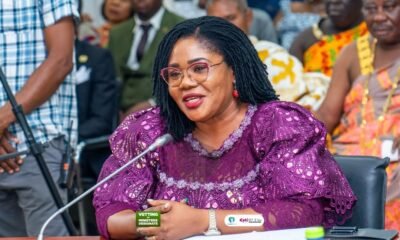Bussiness
BoG seeks partnership to grow fintech space

The Governor of the Bank of Ghana, Dr Ernest Addison, has called for increased partnership between BoG and stakeholders in the financial technology space to help accelerate growth.
He said the partnership should precede the creation of a robust fintech industry that would be able to take advantage of the new economy emerging from digital technology.
“Currently, there are more than 19 million active mobile money accounts driving the digital financial services industry. Prior to the outbreak of the coronavirus (COVID-19) pandemic, this number was 14.4 million.
“Similarly, mobile money interoperability continued to show strong growth of about 365 per cent in transaction volumes and 651 per cent in transaction values between 2019 and 2020.
“Collectively, therefore, we, as stakeholders, must leverage on these positive headwinds to develop and implement digital strategies to spur growth in the digital financial services sector,” Dr Addison said at the 2021 Annual Bankers Week Dinner of the Chartered Institute of Bankers last Saturday in Accra.
The dinner was held in honour of the Governor and was attended by his two deputies, Dr Maxwell Opoku-Afari and Mrs Elsie Addo Awadzi, and other players in the banking industry.
Dr Addison said globally, a new economy was emerging, built on digital technology. “From agriculture, through industry, to commerce, to name just a few, no sector has been spared the transformational power of technology.”
He explained that advanced communication technologies had linked businesses and consumers across national boundaries, breaking down the physical barriers to human interactions.
He said this new wave of change had been described in some circles as the fourth industrial revolution, characterised by the diffusion of knowledge and transfer of technology.
“In Ghana, the trends are not different. The high mobile phone penetration rate, that is the ratio of mobile subscribers to total population, has improved nationwide connectivity and resolved the challenges of distance and unfriendly terrain,” he said.
He said the availability of internet, and the flexibility and customer convenience has facilitated a vibrant online local community, which has supported electronic transactions and prompted a major shift towards e-commerce.
Dr Addison noted that currently businesses in various sectors of the economy — including restaurants, supermarkets, pharmacies, airlines and hotels — were doing a lot of online transactions.
Also, the predominantly youthful population with strong affinity towards and dexterity with digital devices is providing an added push towards Ghana’s digitisation agenda.
“The COVID-19 pandemic was challenging but it also presented some opportunities.
“As you will recall, following the restrictive measures imposed to contain the spread of the virus, BoG, in collaboration with industry stakeholders embarked on measures that encouraged the use of electronic payments,” he said.
Challenged industry
The President of the institute, Rev Patricia Sappor, observed that the banking industry continued to operate in an economy challenged by the impact of the COVID-19 pandemic.
“By the grace and mercies of God, we have been able to move on and made even bigger strides by being strong, solvent and profitable, as revealed by the KPMG Banking Sector Development Report for July 2021.
“This gives us good reasons to thank God for having brought us this far,” she added.
Source: graphic.com.gh
Bussiness
Ghana’s GDP shows economy is fast recovering despite DDEP – Finance Ministry

Ghana’s Gross Domestic Product (GDP) indicates a rapid economic recovery despite global challenges and ongoing debt restructuring, according to the Ministry of Finance (MoF).
The Ministry in a statement today indicated that latest data from the Ghana Statistical Service (GSS), cumulative economic growth for the second quarter (Q2) of 2024 reached 6.9%, a notable increase from the 4.7% recorded in the first quarter of 2024.
The MoF statement further noted that, “The economy’s robust recovery is in response to the macroeconomic stability and growth interventions that government is pursuing under our IMF-supported Post Covid-19 Programme for Economic Growth (PC-PEG).”
According to them, the overall real GDP growth for the first half of 2024 rebounded strongly, with year-on-year GDP growth averaging 5.8% for the period, significantly higher than the 2.9% recorded in the same period in 2023.
By Edem Mensah-Tsotorme
Read full statement below


Bussiness
Facebook, Youtube, online trading companies must be taxed – Deputy Finance Minister

The Deputy Finance Minister Dr Alex Ampaabeng, has proposed that online trading companies should be taxed to bolster the economy.
He noted that these companies, both local and international, generate significant revenue from their Ghanaian clients, which underscores the necessity for taxation.
In an interview with Bernard Avle on Channel One TV’s The Point of View, Dr Ampaabeng pointed out various potential revenue sources for Ghana, including online businesses and content creation companies.
He questioned why other national companies operating in Ghana are taxed, but social media platforms like Youtube and Facebook, which run numerous advertisements, are not included in the Ghanaian tax system.
According to him, these social media companies earn profits from the advertisements they display, and online trading companies also generate income from the sale of their products and services.
He mentioned online trading companies such as Jiji, Jumia, and Tonaton, which he believes surpass all physical marketplaces in Ghana in size.
According to him, “I can’t think of a country which has not gotten a digital service tax system of some sort, so Ghana is long overdue. Just to make an example so that people will appreciate where I’m coming from. Go to Youtube and play a video, within one or two minutes, you are going to watch about two, or three adverts.”
“What it tells you is that Facebook or Youtube is making profits right here in Ghana. Go to your Facebook account, and you are going to see a number of adverts on your right, left. What it is telling you is that Facebook is making profits right here in Ghana and not being taxed. Meanwhile, there are companies operating in Ghana, for jurisdiction reasons, of course, that are being taxed,” he said.
The Deputy Minister added that “So then, it comes to the question of the application of our tax laws. Revenues generated in Ghana are subject to taxes. We have Facebook, TikTok and all those players, these are digital platform owners.”
He stressed, “Then we have the digital or market players, here we are talking about individuals who are using the digital platforms. We have Jiji, Jumia, Tonaton, these combined, are bigger than all physical marketplaces in Ghana. And it tells you the volume of transactions, that are going on there.”
He expressed his hope that individuals earning online profits from Ghanaian residents would be taxed.
“There are conversations ongoing, I wouldn’t want to pre-empt anything, maybe in the future, it might not be anytime soon, what I would like to see, is a Ghana where people who are earning all forms of profits in the country are subject to taxes. People who are trading online to Ghanaian residents, people who are generating revenue from Ghana are allowed to pay taxes,” he noted.
Additionally, he proposed a collaboration with the government to curb cybercrime by registering and verifying these online trading companies.
“We can have a system where the government engages these operators, so individuals will submit their Ghana Card and are registered and verified,”he concluded.
Source: Citinewsroom.com







